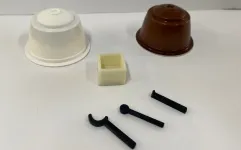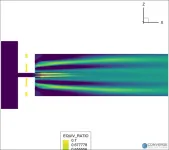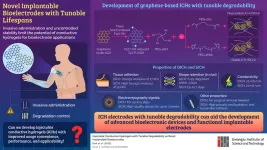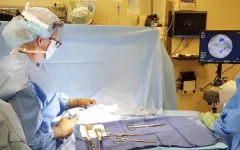(Press-News.org) An article published in the journal ACS Sustainable Chemistry & Engineering brings good news for coffee buffs: the plastic in used coffee pods can be recycled to make filament for 3D printers, minimizing its environmental impact.
The solution was successfully tested by research groups in Brazil at the Federal University of São Carlos (USFCar) and the State University of Campinas (UNICAMP), and in the United Kingdom at Manchester Metropolitan University (MMU).
“We produced new conductive and non-conductive filaments from waste polylactic acid [PLA] from used coffee machine pods. There are many applications for these filaments, including conductive parts for machinery and sensors,” Bruno Campos Janegitz, a co-author of the article, told Agência FAPESP. Janegitz heads the Sensors, Nanomedicine and Nanostructured Materials Laboratory (LSNano) at UFSCar in Araras, São Paulo state.
Brazil is the world’s leading producer and exporter of coffee, as well as its second-largest consumer after the United States. Although most coffee consumed in Brazil is low-quality (Coffea canephora, also known as robusta coffee, with a high proportion of defects and impurities disguised by high roasting of beans and plenty of sugar or sweetener in the cup), demand for gourmet and specialty coffees is steadily growing.
Comprising selected arabica beans (Coffea arabica) with a lower roast to preserve their natural sugars, aroma and flavor, gourmet coffees score 75-80 on the scale used by the Brazilian Coffee Industry Association (ABIC), which goes from 0 to 100. Specialty coffees must also have what is called a socio-environmental certification and score at least 80 on the scale used by the Brazilian Specialty Coffee Association (BSCA).
The quality of the beverage also depends on how it is prepared, and many Brazilians have begun to use the cafetière (also known as French press) or stove-top Moka pot (caffettiera in Italian) instead of the traditional cloth or paper filter. Portable electric espresso machines that use pods are also increasingly popular, albeit far more expensive. The problem with the latter is what to do with used pods.
Although reusable pods exist and some suppliers promote recycling of aluminum pods, most consumers just throw used pods into the garbage bin, especially if they are made of plastic. Considering all the factors involved, calculations made by the São Paulo State Technological Research Institute (IPT) show that “a cup of pod coffee can be as much as 14 times more damaging to the environment than a cup of filter coffee”.
To develop uses for this waste, the researchers produced electrochemical cells with non-conductive filaments of PLA and electrochemical sensors with conductive filaments prepared by adding carbon black to the PLA. Carbon black is a paracrystalline form of carbon that results from incomplete combustion of hydrocarbons. “The electrochemical sensors were used to determine the proportion of caffeine in black tea and arabica coffee,” Janegitz explained.
Production of filament is relatively simple, he added. “We obtain the non-conductive material simply by washing and drying PLA pods, followed by hot extrusion. To obtain the conductive material, we add carbon black before heating and extrusion. The extruded material is then cooled and spooled to produce the filament of interest,” he explained.
The process is a good example of the circular economy, in which the waste produced by an economic activity is not treated as a problem that harms the environment but converted into resources to implement another activity. “The polymer base obtained from used pods can generate devices with a great deal of added value,” Janegitz said.
With Cristiane Kalinke, who has a PhD in analytical chemistry and is a researcher at UNICAMP, Janegitz participated in the study while on a research internship abroad under the supervision of Craig Banks, a professor at MMU and last author of the article. Janegitz was supported by FAPESP via a Thematic Project and a research scholarship abroad. Kalinke was supported by a scholarship for a research internship abroad. Juliano Alves Bonacin, a professor at UNICAMP, also took part in the study.
About São Paulo Research Foundation (FAPESP)
The São Paulo Research Foundation (FAPESP) is a public institution with the mission of supporting scientific research in all fields of knowledge by awarding scholarships, fellowships and grants to investigators linked with higher education and research institutions in the State of São Paulo, Brazil. FAPESP is aware that the very best research can only be done by working with the best researchers internationally. Therefore, it has established partnerships with funding agencies, higher education, private companies, and research organizations in other countries known for the quality of their research and has been encouraging scientists funded by its grants to further develop their international collaboration. You can learn more about FAPESP at www.fapesp.br/en and visit FAPESP news agency at www.agencia.fapesp.br/en to keep updated with the latest scientific breakthroughs FAPESP helps achieve through its many programs, awards and research centers. You may also subscribe to FAPESP news agency at http://agencia.fapesp.br/subscribe.
END
Used coffee pods can be recycled to produce filaments for 3D printing
Tested by Brazilian and British researchers, the process is an example of circular economy technology, in which waste produced in one economic activity is converted into resources for other sectors
2023-05-03
ELSE PRESS RELEASES FROM THIS DATE:
American Stroke Association names 2023 Stroke Heroes
2023-05-03
DALLAS, May 3, 2023 — Six local stroke heroes from across the country are being recognized by the American Stroke Association, a division of the American Heart Association, for their resiliency and dedication to rise up against stroke. Approximately 800,000 Americans have a stroke each year,[1] a leading cause of disability in the U.S., and one in four survivors will have another one.
The American Stroke Association’s annual Stroke Hero Awards honors stroke survivors, health care professionals and family caregivers. The ...
SwRI designs safer, more effective hydrogen injector for gas turbines
2023-05-03
SAN ANTONIO — May 3, 2023 —Southwest Research Institute is designing innovative hydrogen combustion systems for gas turbines used in power generation. The designs prevent flashback, a common concern in hydrogen-fueled combustion systems wherein the flame from the combustor travels into the nozzle, which can result in damaged equipment.
Hydrogen fuel has numerous benefits including the fact that it produces no carbon emissions during the combustion process. However, one of the things that is especially challenging is that it’s highly reactive, which makes it more difficult to work with than natural gas or the liquid fuels ...
Gwangju Institute of Science and Technology researchers enhance thermoelectricity with guided impurity position control
2023-05-03
Thermoelectric materials, substances that convert temperature difference into electricity, find a multitude of applications involving the conversion of waste heat into useful electrical energy. However, they often need to rely on heavy rare earth elements for efficient thermoelectric conversion. This, unfortunately, makes them expensive and environmentally hazardous. In recent years, conjugated polymer-based material has received attention as an environmentally benign alternative to the conventional rare earth metal-based thermoelectric materials.
Owing to their high ...
High-throughput experiments might ensure a better diagnosis of hereditary diseases
2023-05-03
Researchers at the Department of Biology, University of Copenhagen, have now contributed to solving this problem for a specific gene called GCK. The study has just been published in Genome Biology.
Figure: GCK gene
Rasmus Hartmann-Petersen, Professor at the Department of Biology, explains:
- “The GCK gene, which codes for the enzyme glucokinase, regulates the secretion of insulin in the pancreas. GCK gene variants can therefore cause a form of hereditary diabetes. ...
Study finds fluorescent guide can help detect tumor left behind after breast cancer surgery
2023-05-03
A new technique designed to allow surgeons to identify and remove residual tumor tissue during breast-conserving surgery showed promising results in a multi-center trial led by investigators from the Mass General Cancer Center, a member of Mass General Brigham. The clinical trial, which was funded in part by Lumicell, Inc., evaluated Lumicell’s investigational optical imaging agent pegulicianine in fluorescence-guided surgery (pFGS). In pFGS, pegulicianine is activated to a fluorescent form at sites of residual tumor, allowing surgeons to identify tumor remaining in the surgical site during breast cancer surgery. Investigators found that ...
Eric and Wendy Schmidt announce the 2023 Schmidt Science Fellows
2023-05-03
New York, NY, 3 May 2023 - Today, Eric and Wendy Schmidt announced the members of the 2023 cohort of Schmidt Science Fellows. The 32 exceptional early career scientists will receive support to develop research projects and the leadership skills necessary to harness interdisciplinary science to tackle some of the world’s most intractable problems.
Schmidt Science Fellows is the inaugural program of Schmidt Futures, the philanthropic initiative of Eric and Wendy Schmidt with a mission to find and connect talented people to solve our world’s hardest ...
How to protect consumers from deceptive comparison pricing
2023-05-03
Researchers from Duke University, University of Notre Dame, and Microsoft published a new Journal of Marketing article that examines using “true normal prices” during a sale as a way to reduce deceptive pricing tricks.
The study, forthcoming in the Journal of Marketing, is titled “Competition and the Regulation of Fictitious Pricing” and is authored by Richard Staelin, Joel E. Urbany, and Donald Ngwe.
Does competition make firms more honest? Over 50 years ago, the Federal Trade Commission (FTC) assumed the answer was yes when it stopped enforcing ...
Astronomers find distant gas clouds with leftovers of the first stars
2023-05-03
Using ESO’s Very Large Telescope (VLT), researchers have found for the first time the fingerprints left by the explosion of the first stars in the Universe. They detected three distant gas clouds whose chemical composition matches what we expect from the first stellar explosions. These findings bring us one step closer to understanding the nature of the first stars that formed after the Big Bang.
“For the first time ever, we were able to identify the chemical traces of the explosions of the first stars in very distant ...
Sleep phase can reduce anxiety in people with PTSD
2023-05-03
A new study shows that sleep spindles, brief bursts of brain activity occurring during one phase of sleep and captured by EEG, may regulate anxiety in people with post-traumatic stress disorder (PTSD).
The study shines a light on the role of spindles in alleviating anxiety in PTSD as well as confirms their established role in the transfer of new information to longer-term memory storage. The findings challenge recent work by other researchers that has indicated spindles may heighten intrusive and violent thoughts in people with PTSD.
The final draft of the preprint publishes in Biological Psychiatry: Cognitive Neuroscience and Neuroimaging on ...
New investigators join Stowers Institute for Medical Research
2023-05-03
KANSAS CITY, MO—May 3, 2023—The Stowers Institute for Medical Research announced the hiring of three principal investigators to further expand its team of scientists who seek to answer life’s biggest mysteries through foundational research. Siva Sankari, Ph.D., from Massachusetts Institute for Technology, Neşet Özel, Ph.D., from New York University, and Ameya Mashruwala, Ph.D., from Princeton University, will join the Institute’s current team of 17 principal investigators and staff of 500. The addition of these scientists ...
LAST 30 PRESS RELEASES:
Weill Cornell Medicine selected for Prostate Cancer Foundation Challenge Award
Largest high-precision 3D facial database built in China, enabling more lifelike digital humans
SwRI upgrades facilities to expand subsurface safety valve testing to new application
Iron deficiency blocks the growth of young pancreatic cells
Selective forest thinning in the eastern Cascades supports both snowpack and wildfire resilience
A sea of light: HETDEX astronomers reveal hidden structures in the young universe
Some young gamers may be at higher risk of mental health problems, but family and school support can help
Reduce rust by dumping your wok twice, and other kitchen tips
High-fat diet accelerates breast cancer tumor growth and invasion
Leveraging AI models, neuroscientists parse canary songs to better understand human speech
Ultraprocessed food consumption and behavioral outcomes in Canadian children
The ISSCR honors Dr. Kyle M. Loh with the 2026 Early Career Impact Award for Transformative Advances in Stem Cell Biology
The ISSCR honors Alexander Meissner with the 2026 ISSCR Momentum Award for exceptional work in developmental and stem cell epigenetics
The ISSCR honors stem cell COREdinates and CorEUstem with the 2026 ISSCR Public Service Award
Minimally invasive procedure effectively treats small kidney cancers
SwRI earns CMMC Level 2 cybersecurity certification
Doctors and nurses believe their own substance use affects patients
Life forms can planet hop on asteroid debris – and survive
Sylvia Hurtado voted AERA President-Elect; key members elected to AERA Council
Mount Sinai and King Saud University Medical City forge a three-year collaboration to advance precision medicine in familial inflammatory bowel disease
AI biases can influence people’s perception of history
Prenatal opioid exposure and well-being through adolescence
Big and small dogs both impact indoor air quality, just differently
Wearing a weighted vest to strengthen bones? Make sure you’re moving
Microbe survives the pressures of impact-induced ejection from Mars
Asteroid samples offer new insights into conditions when the solar system formed
Fecal transplants from older mice significantly improve ovarian function and fertility in younger mice
Delight for diastereomer production: A novel strategy for organic chemistry
Permafrost is key to carbon storage. That makes northern wildfires even more dangerous
Hairdressers could be a secret weapon in tackling climate change, new research finds
[Press-News.org] Used coffee pods can be recycled to produce filaments for 3D printingTested by Brazilian and British researchers, the process is an example of circular economy technology, in which waste produced in one economic activity is converted into resources for other sectors







